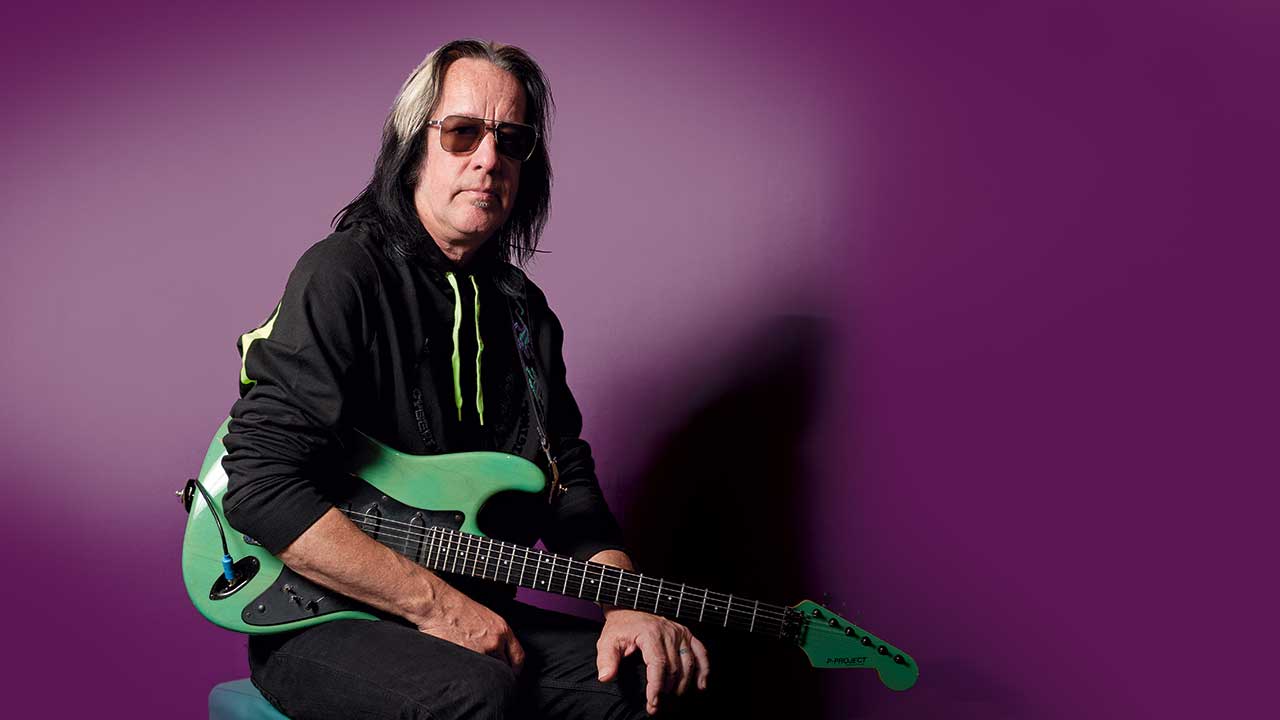Todd Rundgren: hall of famer, singer, producer, songwriter... and guitar hero?
From using a guitar to simulate motorbikes on Bat Out Of Hell, and the sound of strangled chickens on A Wizard, A True Star, we revisit the case for Todd Rundgren’s guitar genius

If Todd Rundgren isn’t at the pinnacle of the guitar-hero pantheon, then he only has himself to blame. The 72-year-old wears too many hats, and too damn well. He’s the legendary producer who worked on Meat Loaf’s Bat Out Of Hell album and the New York Dolls’ scuzzy-arsed debut.
He’s the golden-touch hit maker who broke big with his 1972 album Something/Anything?, and the visionary who forked left into the wilds on 1973’s A Wizard, A True Star.
As a guitarist, though, Rundgren is a self-confessed part-timer. It says it all that on his recent Clearly Human virtual tour he “only plays guitar on about four songs”, while this year’s upcoming Space Force album sees him lighten his load with cameos from Steve Vai, Rick Nielsen and more.
Rundgren’s refusenik tendencies are a curious thing, because when he plugs in he’s untouchable, from the mathematically complex playing of his avant-garde 70s prog outfit Utopia, to his glorious solo on Bat’s title track (described by Meat Loaf as “one of the most mind-blowing moments of my life to watch”).
Rundgren simply shrugs: “I just never had the focus to be a guitar hero."

How did you fall for the guitar?
I was just a natural born musician. Music was my thing, as soon as my hands got big enough to play. I had a little bit of interest in guitar with Duane Eddy and Lonnie Mack. But then [in 1960] The Ventures came out with Walk, Don’t Run and I was smitten, I had to play the guitar.
Sign up below to get the latest from Classic Rock, plus exclusive special offers, direct to your inbox!
I hectored my parents into getting me a twenty-five-dollar acoustic. It came with three months of lessons at the local music store, which I hated. I counted the days until the lessons were over. I could pick out a song in ten minutes, but I hated reading sheet music.
When I got serious I was super-heavily influenced by Eric Clapton, and in trying to to play like him I developed half a dozen vibrato techniques, all of which I still use. I once jammed with John Mayall on a blues cruise, playing All Your Love from the classic Bluesbreakers album [1966]. Afterwards, he told me, ‘You played it just like Eric.’ Well, of course I did!
You were a big Who fan. Did it matter that Townshend wasn’t a virtuoso?
No, it did not. Pete Townshend redefined the guitar. Most people think of the guitar as their love interest. For him it was the object of his anger.
There’s a theory that because you’re such an esteemed producer, singer and songwriter, your guitar skills often get overlooked.
Well, it’s probably accurate. There was a time when the guitar was my principal instrument. It was everything that I cared about. For a little window there, between Woody’s Truck Stop and the beginning of The Nazz, I was a local guitar hero, considered the best player in downtown Philadelphia.
By the time we got to the second Nazz record my mind was already wandering musically, and I was being influenced as much by Laura Nyro. I began to notice that the guitar was becoming secondary, because it wasn’t as flexible an instrument to compose on. As time has gone on, my instrument is actually the studio, and the guitar will be a component of that.
Your playing on Bat Out Of Hell is incredible, though. What do you remember about it?
I’d worked out a few melodies, but most all the guitar parts were improvised, and many of the solos were done live. On that album I was playing a Fender Mustang, which has a slightly reduced scale, so the strings are really loose. If you push down the tailpiece they’re actually sagging, and if you pull it up you just go into the stratosphere.
So I was getting all sorts of weird noises, and becoming more noise-oriented than note-oriented. That’s how that whole ‘motorcycle’ guitar solo thing came about. [Bat Out Of Hell writer] Jim Steinman wanted to get a pre-recorded motorcycle sound effect. But I said:, ‘Let me try.’ It only took two takes to convince him.
Most guitarists say they play better straight. How did LSD affect your playing?
Taking psychedelics gave me a generally more adventurous attitude about music, and I started to think of the guitar as not simply something that plays notes, but sounds and textures. I started using guitar synths to change the sound into something more electronic, or like birds being strangled.
It’s funny, five years ago I worked with two Swedish electronica artists called Hans Peter Lindstrom and Emil Nikolaisen. When I came to the studio, they had that same EMS guitar synth I’d used, and said: “Can you make some of those weird strangling-chicken noises?” So I just did a lot of screeching around.
Which underrated players do you rate?
I’ve worked with so many amazing players. I’m sure that most of them have been rated. One of the first players I worked with that knocked the socks off me was Amos Garrett. He was substantially a country player, and I hated country music, but the things he could do with the guitar were so amazing. Like bending two strings in opposite directions. I did an Australian band called Dragon [Editor's note: Dragon are originally from New Zealand] and they brought in Tommy Emmanuel. I was totally amazed. He works everywhere – he’s a real workhorse – and if people don’t know who Tommy Emmanuel is, they should.
On the flip side, you didn’t rate the New York Dolls as guitar players?
Well, there was a certain ethos in the New York Dolls, and the punk music they presumably inspired, and that was: if you learned to play your instrument too well you were a poser. It wasn’t about your skills as an instrumentalist, it was more about your limitations. In that sense, if Johnny Thunders aspired to be anything, it was Keith Richards. And we all know that Keith Richards doesn’t really play that much, y’know? Half of what he does is open tunings, and he does an occasional solo, and they all sound the same.
So there were never any aspirations to be a great guitar player, either in the New York Dolls or any of the bands that emulated them. One of the reasons why music critics were so into the Dolls was because it was finally a kind of music they could imagine playing themselves.
When were you doing the best guitar playing of your career?
My technique was probably at its best in the heyday of Utopia, the large six-piece band. I realised that I went to a lot of trouble to learn how to play guitar, but now I wasn’t playing it any more. We were emulating acts like the Mahavishnu Orchestra, and also I had a lot of keyboard virtuosos in the band, and they were kind of challenging me.
It’s easy to play really fast on a keyboard. It’s a little harder on the guitar, because you have to synchronise both hands. So that kind of drove me to improve my technique. Since then the largest commitment I’ve made to recovering my playing technique was Todd Rundgren’s Johnson [2011], an album full of Robert Johnson covers done in a sixties manner.
You’re completed a virtual tour. How does it affect your playing when there’s no physical audience?
It took me a little while to get used to performing again. The hardest thing is not having gigged in over a year and a half, and just generally slowing down and your fingers getting soft. But once I got things tuned in, it actually doesn’t make a whole lot of difference to me whether there’s an audience there.
A lot of times, I just close my eyes and go off. I look to see where I’m going, so I don’t fall off the stage, but otherwise I tend not to be focusing that much on the audience. I’m just trying to remember what to play [laughs].
Todd Rundgren will be inducted into the Rock and Roll Hall of Fame this year.
Henry Yates has been a freelance journalist since 2002 and written about music for titles including The Guardian, The Telegraph, NME, Classic Rock, Guitarist, Total Guitar and Metal Hammer. He is the author of Walter Trout's official biography, Rescued From Reality, a music pundit on Times Radio and BBC TV, and an interviewer who has spoken to Brian May, Jimmy Page, Ozzy Osbourne, Ronnie Wood, Dave Grohl, Marilyn Manson, Kiefer Sutherland and many more.

